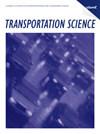Data-Driven Optimization for Air Traffic Flow Management with Trajectory Preferences
IF 4.8
2区 工程技术
Q1 OPERATIONS RESEARCH & MANAGEMENT SCIENCE
引用次数: 0
Abstract
In this paper, we present a novel data-driven optimization approach for trajectory-based air traffic flow management (ATFM). A key aspect of the proposed approach is the inclusion of airspace users’ trajectory preferences, which are computed from traffic data by combining clustering and classification techniques. Machine learning is also used to extract consistent trajectory options, whereas optimization is applied to resolve demand-capacity imbalances by means of a mathematical programming model that judiciously assigns a feasible four-dimensional trajectory and a possible ground delay to each flight. The methodology has been tested on instances extracted from the Eurocontrol data repository. With more than 32,000 flights considered, we solve the largest instances of the ATFM problem available in the literature in short computational times that are reasonable from the practical point of view. As a by-product, we highlight the trade-off between preferences and delays as well as the potential benefits. Indeed, computing efficient solutions to the problem facilitates a consensus between the network manager and airspace users. In view of the level of accuracy of the solutions and the excellent computational performance, we are optimistic that the proposed approach can make a significant contribution to the development of the next generation of air traffic flow management tools.利用轨迹偏好进行空中交通流量管理的数据驱动优化
本文针对基于轨迹的空中交通流量管理(ATFM)提出了一种新颖的数据驱动优化方法。所提方法的一个关键方面是纳入了空域用户的轨迹偏好,通过结合聚类和分类技术,从交通数据中计算出用户的轨迹偏好。机器学习也用于提取一致的轨迹选项,而优化则通过数学编程模型来解决需求-容量不平衡的问题,该模型可明智地为每个航班分配可行的四维轨迹和可能的地面延误。该方法已在欧洲控制中心数据存储库中提取的实例上进行了测试。我们考虑了超过 32,000 个航班,在较短的计算时间内解决了文献中最大的 ATFM 问题实例,从实用角度来看是合理的。作为副产品,我们强调了偏好和延迟之间的权衡以及潜在的好处。事实上,计算问题的有效解决方案有助于网络管理员和空域用户达成共识。鉴于解决方案的准确性和出色的计算性能,我们乐观地认为,所提出的方法可为下一代空中交通流量管理工具的开发做出重大贡献。
本文章由计算机程序翻译,如有差异,请以英文原文为准。
求助全文
约1分钟内获得全文
求助全文
来源期刊

Transportation Science
工程技术-运筹学与管理科学
CiteScore
8.30
自引率
10.90%
发文量
111
审稿时长
12 months
期刊介绍:
Transportation Science, published quarterly by INFORMS, is the flagship journal of the Transportation Science and Logistics Society of INFORMS. As the foremost scientific journal in the cross-disciplinary operational research field of transportation analysis, Transportation Science publishes high-quality original contributions and surveys on phenomena associated with all modes of transportation, present and prospective, including mainly all levels of planning, design, economic, operational, and social aspects. Transportation Science focuses primarily on fundamental theories, coupled with observational and experimental studies of transportation and logistics phenomena and processes, mathematical models, advanced methodologies and novel applications in transportation and logistics systems analysis, planning and design. The journal covers a broad range of topics that include vehicular and human traffic flow theories, models and their application to traffic operations and management, strategic, tactical, and operational planning of transportation and logistics systems; performance analysis methods and system design and optimization; theories and analysis methods for network and spatial activity interaction, equilibrium and dynamics; economics of transportation system supply and evaluation; methodologies for analysis of transportation user behavior and the demand for transportation and logistics services.
Transportation Science is international in scope, with editors from nations around the globe. The editorial board reflects the diverse interdisciplinary interests of the transportation science and logistics community, with members that hold primary affiliations in engineering (civil, industrial, and aeronautical), physics, economics, applied mathematics, and business.
 求助内容:
求助内容: 应助结果提醒方式:
应助结果提醒方式:


